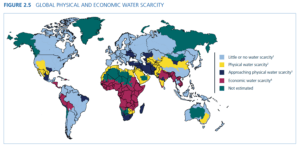Ethical Dilemma: To profit from drinking water or to let people die of thirst?

Climate change will affect our drinking water supply. This presents a huge financial opportunity, but it comes with moral hazard.
Climate change has the potential to decrease our drinking water supply, increase demand for clean water, and drive up the price for that water. According to a recent UN report, “Climate change exacerbates multiple threats to water availability… There is high agreement among scientists that climate change will alter stream flow regimes, deteriorate water quality, and change spatial and temporal patterns of precipitation and water availability.”[i] This figure, from the same UN report, shows the currently water scarcity, which will only be exacerbated by global warming.
UN report, shows the currently water scarcity, which will only be exacerbated by global warming.
Specifically, the Intergovernmental Panel on Climate Change’s (IPCC) projects that “for each degree of global warming, approximately 7% of the global population is projected to be exposed to a decrease of renewable water resources of at least 20%”[ii]. This translates to about a 1.4% decrease in the world’s global renewable water resources for each degree of global warming.
Per the US EPA, “Increases in average global temperatures are expected to be within the range of 0.5°F to 8.6°F by 2100.”[iii] Putting these two studies together, we can estimate that the world’s global renewable water resources will decline between 1% and 12% in the next 85 years.
This presents a huge business opportunity for those companies that are in the business of providing clean water. SUEZ WATER is one such company. SUEZ provides solutions that include clean drinking water and wastewater management, typically partnering with municipalities such as Portage, MI and Jersey City, NJ. The company also offers wastewater treatment services to safely return treated water to rivers, lakes and streams, such as their treatment plant in El Segundo, CA, which recycles wastewater for irrigation and industrial use.[iv] It’s highly likely that demand for these services will increase significantly as water becomes scarcer.
However, the scarcity of water will also present a threat to SUEZ’s business because other, previously cost-prohibitive ways of obtaining clean water may now be cost effective (assuming that the price of water increases as the fresh water supply decreases). I think the key technology here will be desalination. We’ve already seen examples of desalination plants that provide billions of liters of freshwater. One such example is the Victorian Desalination Project in Melbourne. This seawater desalination plant was built from 2007 to 2012, by a partnership between the Australian government and private company AquaSure. The plant is staffed by 52 people and is capable of supplying up to 150 billion liters of high quality drinking water annually.[v] However, even after costing $3.5 billion to build, the plant still often sits idle because it is very expensive to run. Australia is a rich country, and can afford to build an expensive plant just in case they need it. For most countries, though, given the price of water now, desalination isn’t very financially viable. However, if either the price of water increases (which it likely will as demand increases) or the cost of desalination decreases (which it may with technological innovation), then desalination may become extremely profitable, and it could provide clean drinking water to everyone in the world that needs it.
SUEZ should invest in Research and Development to improve the desalination technology, and then build a portable (floating) desalination plant, so it can be moved to wherever in the world there is the greatest need for water. The portable nature of this technology will help SUEZ to respond to the difficulty in determining where in the world the water shortage will most acutely manifest.
It should be noted that there is a public relations risk to this. It would be very expensive to build this plant, and as such, SUEZ would need to charge a high price for water. Because many of those in need of water live in developing countries, there is a risk that SUEZ could look like it is exploiting poor people in developing countries who are dying of thirst.
In Pope Francis’s latest encyclical letter: LAUDATO SI’ (ON CARE FOR OUR COMMON HOME), the pope wrote that “access to safe drinkable water is a basic and universal human right, since it is essential to human survival… The environmental repercussions could affect billions of people; it is also conceivable that the control of water by large multinational businesses may become a major source of conflict in this century.”[vi] If the Pope, and other world leaders condemn the floating desalination plant as exploitive, there could be negative backlash against the company. Even though SUEZ would have invested heavily in R&D to produce this desalination plant, and may only be recovering its investment, the negative perception may hurt other parts of its business. Even with this risk, in my opinion, the desalination technology is still worth the investment. (word count: 779)
[i] WWAP (United Nations World Water Assessment Programme). 2016. The United Nations
World Water Development Report 2016: Water and Jobs. Paris, UNESCO
[ii] Future of Climate Change | Climate Change Science | US EPA. 2016. Future of Climate Change | Climate Change Science | US EPA. [ONLINE] Available at: https://www.epa.gov/climate-change-science/future-climate-change. [Accessed 04 November 2016].
[iii] Future of Climate Change | Climate Change Science | US EPA. 2016. Future of Climate Change | Climate Change Science | US EPA. [ONLINE] Available at: https://www.epa.gov/climate-change-science/future-climate-change. [Accessed 04 November 2016]
[iv] Water Services | SUEZ Water. 2016. Water Services | SUEZ Water. [ONLINE] Available at: http://www.mysuezwater.com/about-us/water-services. [Accessed 04 November 2016].
[v] History. 2016. History. [ONLINE] Available at: https://www.aquasure.com.au/history. [Accessed 04 November 2016].
[vi] Laudato si’ (24 May 2015) | Francis. 2016. Laudato si’ (24 May 2015) | Francis. [ONLINE] Available at: http://w2.vatican.va/content/francesco/en/encyclicals/documents/papa-francesco_20150524_enciclica-laudato-si.html. [Accessed 04 November 2016].



Markets are the best mechanism that humans have created to allocate resources. The author’s discussion of moral hazard presumes that markets have been unable to effectively regulate water. Like any resource some people will not get as much as they need. If you can think of a better mechanism than markets that would be great, but that does not exist.
I appreciated this post. In my previous life as a private equity investor, we looked into a number of water treatment opportunities as a way to monetize this trend towards technologies supporting potable water. In fact, one of the last deals I worked on, which we subsequently closed after I left, was a water treatment company called Culligan Water (press release below).
I am a bit skeptical that it is possible to build a floating desalination plant – right now that seems a little too “blue sky” of a technology opportunity. However, I am hopeful that I am wrong, because I do think that the declining rates in potable water is a major issue facing the world today. The most talented and entrepreneurial minds in our generation are attracted to technology, but not to water technology. I hope that will change.
https://www.moodys.com/research/Moodys-assigns-a-B3-CFR-to-Culligan-for-LBO-Outlook–PR_357092
TBD, it is simplistic (not to mention unethical) to argue that markets are the best mechanism to allocate resources, therefore we should let poor people die of thirst. As long as there have been markets, there have been market failures that prevent the efficient allocation of goods. Incidentally, climate change is the perfect example of this. The environment, including water resources, is a public good that has been depleted, most of all by developed nations. Climate change efforts have suffered from underinvestment because investors cannot capture enough of the public benefits relative to privately borne costs, resulting in an inefficient outcome in the aggregate. You are suggesting that we respond to this enormous market failure with more market solutions that penalize the poorest (who, by the way, are also the smallest contributors to climate change) because this is the “best mechanism” we have. I think we can do better. Dave presents an interesting technological solution, but it will require smart public policy decisions to allocate resources appropriately. A big part of the policy solution will be to reduce demand – e.g., by incentivizing less water-intensive food production and designing smarter water pricing strategies to encourage water management – and ration supply.
Very insightful post. I like the focus on an actionable plan to react to lower water supplies in the future and the dilemma between future water prices with human need. I would like to read more of what Dave thinks on the global population growth’s effect on climate change and water demand. One way to reduce the global population growth is to increase spending and access to education. Developed regions have less children than non-developed regions, reducing the overall global water demand. This will help to avoid the band-aid solution of creating a gargantuan flotilla of desalination plants to combat world thirst. Would you consider the desalination plants a short-term solution to the long-term problem or will we all be drinking desalinated ocean water sooner than we think?
http://www.northeastern.edu/news/2012/03/ganguly-2/
Interesting read! Few thoughts:
– Don’t you think that the scarcity of clean water in a free market would attract competition that will all work to capture the value created, and hence margins will decrease and eventually price will be adjusted at equilibrium to satisfy all demand? In other words, why shouldn’t free market correct itself? (the intensity of the capital investment needed is not necessarily prohibitive for competition)
– I think what Suez is doing doesn’t necessarily contradict with what the Pope was preaching for. I agree, access to clean water should not be monopolized by large multinationals. Owning a desalination plant, however, doesn’t make it a monopoly, or grant it a huge control. What matters at the end of the day is the type of agreements that these companies strike with the respective governments. Hence, I think that the pope is saying that governments should keep the needs of their citizens at heart when they negotiate deals and set policies that regulate the private sector’s access to this universal right. What do you think?